- Home
- Mollie Cox Bryan
Scrapbook of Secrets Page 8
Scrapbook of Secrets Read online
Page 8
“Thank you for coming,” Vera heard a voice behind her say. She turned to face Robert.
“I’m so sorry for your loss, Mr. Dasher—the children, if there’s anything I can do,” Vera said, fidgeting with her fork, trying to place it on the plate so it wouldn’t fall off.
“Well,” he said, looking away from her, “there is something you can do. But we’ll talk about it later, if, ah, that’s all right.”
Vera was immediately uncomfortable as she noted his difficulty making eye contact with her, or even looking at her while he spoke to her. “Shifty” was the word that came to mind as a chill traveled through her.
“Of course,” she said. “You know where to find me. Excuse me, please. I see my husband over there ... ,” she said, and tried to slide through the crowd.
“This is my brother-in-law, Zeb McClain,” Robert went on as if he hadn’t heard her.
Socially inept.
“Nice to meet you, Mr. McClain.” She turned to him and shook his hand, big and calloused. He was dressed in a variation of Old Order Mennonite clothing—a dark plain suit—his funeral clothes, Sunday best? Interestingly, even though he wore the beard with no mustache, which she found extremely unattractive, he was perhaps the prettiest man she’d ever laid her eyes on. His blue eyes were framed with long, dark eyelashes, and his features were chiseled in a face that was set off by a strong, almost square jawline and a beautiful dimple in his chin, as well as around his full mouth.
Very John Travolta-ish, she mused, making a mental note to find out more about this man. Who were his people? He didn’t look local at all.
Vera made her way over to her husband. Bill was standing with Sheila and her husband, who both held plates of vegetable dishes—broccoli with cheese, scalloped potatoes, green beans, and deep purple pickled beets. Bill was in hog heaven, for he was already on to the desserts and eating apple crumble when Vera entered the circle.
“I saw you talking with Robert,” Bill said, with an edge to his slightly raised voice. He was sweating profusely and was taking his handkerchief to his head. His eyes were red and puffy from the weeping at the service.
“Yes,” Vera said. “He’s a strange man.”
“What do you mean?”
“Mmm. These beets are delicious,” Sheila said. Her lips were stained with a slight beet color.
“I’ll tell you more when we get home,” Vera quickly said, trying to shake the weird feeling Robert had given her. She attempted to focus on her food.
“Yes,” Sheila said, “I’ll tell you as well.”
Steve grinned and lifted his eyebrows. “It sounds so mysterious.”
“It’s mysterious and sad all at once,” Vera said. “Oh, look! Someone brought red velvet cake. Think I’ll go and get some.”
“I’ll come with you,” Sheila said. They left their men standing together, as they often did during any special occasion. These two men could not have been any more different. There was Bill and his highbrow, Ivy League, Yankee sensibilities, and Steve, a good old native boy who’d done well in his family’s tractor and outdoor sporting-goods business. He’d come up with a mountain-touring idea and branched the company into an expedition group. He often was gone for days leading a group of city folks into the mountain wilderness—all outfitted with goods from his own store.
For all intents and purposes, Vera thought, Bill was the perfect husband—always kind and polite, cleaned up after himself, and he was an attentive lover, for which she had always been grateful. But lately she just didn’t want to be bothered. Sex was more trouble than it was worth—so more often than not, she told him no. She explained that she was tired, or not feeling good. And he would never question her. But sometimes the thought of making love with him absolutely just filled her with dread.
“Listen,” Sheila said as they were getting their red velvet cake. “I’ve been thinking.”
“Uh-oh,” Vera said. “Do I even want to know?” She slid the slice of the cake onto her plate.
Sheila grabbed her by the arm and pulled her into a corner. “Do you know if there was a suicide note?”
“I think I heard someone say that there wasn’t, but I’m not sure.”
Sheila’s voice lowered. “Do you really think she killed herself?”
Vera’s heart skipped a beat. “Well, of course, that’s what they listed the cause of death as—a self-inflicted gunshot wound to the chest.”
Sheila looked at Vera and shook her head. “Think about it. Look around you. We are in her home. Does this place say depressed to you?”
The walls were filled with pictures of her children and one of her parents—maybe that was a grandmother in that old-fashioned round gold frame. But Vera knew that held no meaning if the woman was struggling with depression. It was a chemistry thing in the body—out of whack. The walls were painted bright colors—light blue, almost the shade of the mountains, and sage green in the kitchen. It was kept well—everything in the house was sparkling clean, even the windows.
The green plaid couch and matching chair were a little worn, Vera noticed, but with such a large family, it was entirely excusable. The afghan throw over the back of the couch made Vera sad. Was that what Maggie Rae wrapped around herself while watching television? Or did she wrap it around the children as they dozed off beside her? With all of the children in the house, Maggie Rae probably didn’t get much TV time. Still, at the same time, Vera liked to imagine the comfort Maggie Rae might have found beneath that handmade afghan.
“What does depressed look like?” Vera asked.
“Not this,” Sheila said, looking very solemn in her black suit. “Look at those plants. She tended them well, even in the midst of having all these children. Look at the beautiful paintings and the lovely drapes.”
“Yet, she never filled her scrapbooks,” Vera reminded her. “What was that about?”
Sheila shrugged. Vera caught the glare off her tiny rhinestone pin. “Could be she just never had time. But some people are reluctant to put lives onto paper. It can be painful. I went to this session at one of the scrapbook conferences where the teacher talked about the therapeutic nature of scrapbooking. For some people, it’s just what they need. For others, it’s way too much to really look at.”
“And you paid to hear someone tell you that? Honestly, Sheila,” Vera chided.
“Sometimes you’re just a bitch,” Sheila told her, shaking her head.
“I may be a bitch, but I work too hard for my money to go and pay for a pop psychologist to charge me to tell me about the psychological aspect to a hobby. For God’s sake. Some people just sap all the fun out of everything,” Vera said, taking a bite of the cake.
“Now, listen, I’ve thought about going and getting the certificate.” Sheila’s expression became serious. Her jaw clenched and her brown eyes filled with a surge of confidence.
“What? A certificate in what?”
“Therapeutic scrapbooking. It’s a form of bibliother-apy,” Sheila told her. “It might be a rewarding thing to do.”
Vera rolled her heavily lined blue eyes.
“You know, you set up these groups of, say, women who’ve been abused—”
Vera’s eyes met Sheila’s. “He killed her, didn’t he?” she whispered frantically. “He killed Maggie Rae. My mother always told me that a man who beats a woman would just as soon kill her.”
Sheila turned her back on the crowd. “I think ... you may be right. So what do we do now?”
“I need some air,” Vera said, moving toward the door, with Sheila trailing behind her.
The fresh air, while it helped her to breathe, did not prevent the dizziness that overtook her. The columns on the porch looked wobbly and things appeared to be closing in—and then Vera dropped to the wooden porch floor.
“Vera!” she heard before the dark.
Chapter 15
Annie and Bea sat on the porch for a while, watching the hummingbirds and the feeder.
“They are marvelous,” Ann
ie said. “I’ve never seen them anywhere around my place.”
“You have to plant some special flowers, and those feeders help,” Bea told her. “I love to watch them. It’s gotten to be quite a pastime for me.”
“Funny,” Annie said. “I never have time for a pastime.”
“Children keep you busy, but that will change,” Bea said. “I just love the beautiful blue color of that bird—I think that one is a male.”
“It would figure, wouldn’t it?” She was thinking about Robert and Bill, both, for some odd reason.
“Here’s what I’ve been thinking,” said Bea. “If we go to the police and they arrest the man for murder, what would happen to those children?”
“Well, I don’t know,” Annie replied, “but they do have an aunt. She brought them to the park the other day. Maybe she’d take them. Although she seemed, I don’t know, like an odd woman. But we can’t let him get away with murder—if indeed that’s what happened.”
“And then,” Bea said, placing her glass on a small wicker table, “I wonder if the police already suspect him. I mean, here we are a bunch of women who aren’t police, and we are already concluding that he killed her.”
“We have evidence that he probably beat her. They don’t, or at least not that we know of,” Annie replied.
“If you go to the police with that evidence, you’ll have to tell them how you got it,” Beatrice said, grinning.
Annie laughed. “Yes, I know. But I’m not too worried about that.”
“What are you worried about, Annie?”
“Well,” she replied. “There are things that might come up about Maggie Rae that she or her family would not appreciate.”
“Like what?” Bea’s heavy lids raised up with her eyebrows, revealing penetrating grayish blue eyes.
“Like that she wrote erotica, under another name.”
“Oh.”
“And, quite honestly, I think this town would have a field day with something like that.”
“What do you mean?”
“I mean, once people find out about that, then Maggie Rae’s murder may be justified. You know, they will say she was a loose woman and got what she deserved.”
Beatrice thought for a moment. “I’d like to say you’re wrong, but you may be right. I’m sitting here right now and wondering what kind of a woman writes that trash—not that I think she’d deserve to be killed for it.”
“I didn’t know her—but she was a beautiful writer and her erotica was good. I mean, it wasn’t trashy, you know? The stories are fabulous, even without the sex.”
“Like a D. H. Lawrence or an Anaïs Nin, you mean.”
“Yes. Well crafted.”
“Lawrence is one of my favorite writers. He was one of Ed’s favorites, too. Oh, my husband loved to read. I still have some of his books.”
“I heard he was a doctor.”
“Yes, a fine physician. He practiced right out of this house. We lived upstairs and he practiced downstairs. It worked out, especially after Vera was born. Sometimes I spent days in Charlottesville at the university and I often traveled to New York, and Ed was able to manage.”
“Most women your age didn’t have much of a career, I imagine. What did you do?”
“I was a physicist. For many years, I was a practicing researcher. Then I began to be enamored by quantum physics and have been studying it ever since.”
“Quantum physics?”
“Yes. Space and time. Matter and energy. Our roles in creating our own reality. Fascinating stuff,” Beatrice said. She loved to watch the reaction on people’s faces when she told them she studied quantum physics.
“Oh, yes,” Annie said, without flinching or seeming surprised. “I recently read a book about that, and I’ve seen a movie, kind of an odd movie, called The Life of Quantum Mechanics. Do you know it?”
Beatrice’s mouth dropped open. “Y-yes.”
“I really liked it,” Annie went on. “I liked the ideas behind it. I’m not sure I understand it or believe it completely, you know.”
“Well,” Beatrice said, thinking she and Annie were going to be great friends, “many of my students were interviewed for that film.”
“Very cool,” Annie said.
“Indeed,” Beatrice replied. “I’ve got quite a quantum physics library inside, if you’d care to take a look.”
“Oh, sure,” Annie said. “But I was sort of expecting some D. H. Lawrence.”
Beatrice giggled. “Oh, we’ve got plenty of that, too.”
Just as they got out of their chairs, an ambulance whizzed by and stopped in front of the Dasher home.
“Now, that’s odd,” Bea said. “An ambulance at a memorial reception.”
They stood motionless, watching the red lights, straining to see the crowd gathering around the ambulance.
“Oh, well, guess we’ll hear about it soon enough,” Bea said. “C’mon in.”
Annie’s eyes lit up when she saw the built-in bookcases in the library. Bea watched as Annie’s long fingers touched the backs of her beautiful books—many of them she had shared with Ed. Bea noticed Annie’s nails were cut short, and they were clean. This woman didn’t have time to paint her nails. Her hair was loosely contained in a bun gathered at the back of her neck. All business, Bea mused. Yet, she was a stay-at-home mom and gave up a career as a reporter to be a full-time mother. Well, that was according to Vera.
“So you used to be a reporter.”
“Yes,” Annie said, obviously mesmerized by the books in front of her. “I freelanced for a while, but it just got to be too difficult after Ben was born.”
“So you stopped writing?”
Annie looked at her. “For now. I can’t seem to manage to put sentences together. But someday I hope to get back to writing.”
Interesting young woman, who seemed to have intellect, yet put her kids first. She had a handle on time—that there would be enough of it someday for her to write.
“I hope you do,” Beatrice said. “Oh, that’s a good book, really. Don’t let the title put you off.”
Annie laughed. “Quantum Physics for Dummies, eh? I like it.”
An ambulance flew down the road again, its sirens interrupting a perfectly good conversation.
Then they heard a strange scuffling noise—someone was on the porch. Beatrice opened the door to a winded Sheila, in her stocking feet, with her high heels in her hand.
Chapter 16
Vera was dreaming. She was certain of it. She was sitting on her father’s lap, just the way she used to, even as a grown woman. She could feel his arms around her, smell his tobacco, and feel his breath on her neck as she leaned her head down on his shoulder.
“Vera,”he said. “You’re not happy. Time is wasting.”
“What do you mean, Daddy?” She wanted to pick up her head, but she was so tired and couldn’t manage.
He ran his fingers through her hair and against her forehead. “Oh, Vera, I wasn’t ready to leave you or your mother. And you weren’t ready to leave New York.”
“What else could I do?”
“You can’t go backward, only forward. Find out what makes you happy now.”
She thought about her mother, Sheila, her dancing school, and Bill. None of it seemed to make her happy. In fact, when she thought about the people in her life, she sort of went numb. It wasn’t just Bill. It was everybody.
“That’s what I mean,” her father said. “Believe me when I tell you, every day is a gift. Don’t waste it.”
“Oh, Daddy, I’m not. I’m making a difference here.”
“Forty-one years old and pregnant?” No, it wasn’t her father speaking. She struggled to open her eyes. It was a blurry Bill, talking with that same handsome doctor who had operated on her mother.
“Yes,” the doctor said. “Vera is pregnant.”
Vera thought she was still dreaming and closed her eyes. She could hear voices as she drifted back off to a place that wasn’t quite sleep. “Daddy,” she
said out loud. “Daddy?”
“Vera, are you awake?” Bill rushed to her side and kissed her on the cheek. Tears glistened in his eyes. She nodded. “God, you gave us a scare,” he said, voice quavering.
Just then, she could hear her mother’s voice.
“Goddamn you, get out of my way! My daughter is in that room,” she bellowed. Vera wanted to close her eyes again and now hoped that she was dreaming. But the door flew open.
“Bill, what’s going on?” Bea asked, with Annie at her side. Sheila came in on their heels, still carrying her high heels from the memorial service.
“Calm down, Beatrice,” Bill said calmly. “She’s fine.”
“Yes,” Vera said weakly, smiling at the crowd of women gathering around her bed.
“You don’t pass out if you’re fine,” Sheila said. “I’m no doctor,” she said, looking at the doctor, “but I know that.”
He raised his eyebrows, as if to say, You again?
“Excuse me, please,” he said, and left the room.
“Well, she has a point,” Beatrice said.
“Sit down, Beatrice,” Bill said, pulling up a chair, close to Vera’s bed. “You’re going to need to.”
“What do you mean?” she asked, slowly sitting in the chair.
“I wanted to give Vera the news alone, you know like all couples at a time like this. But since the day I married her, I knew you two came in a package,” he said, looking at Bea and Sheila. “So I want you all to know that Vera and I are expecting a baby.”
“That’s impossible,” Vera said, her heart beginning to race.
“That’s what we thought, but that’s why you fainted. You’re eight weeks pregnant.”
“Hot damn,” Beatrice finally said. “I’m going to be a grandmother.”
Sheila squealed, and Annie’s hands went to her mouth.
Bill’s eyes caught Vera’s. It was a moment of connection, a moment of acknowledgment. They would set their past right. They would have this child. A botched abortion in the Bronx had left Vera with problems her whole life—problems that they said could never be overcome.

 No Charm Intended
No Charm Intended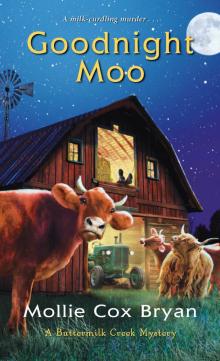 Goodnight Moo
Goodnight Moo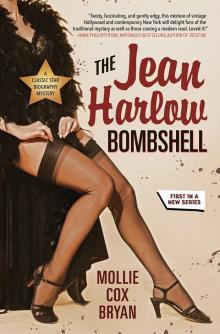 The Jean Harlow Bombshell
The Jean Harlow Bombshell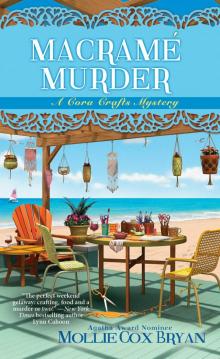 Macramé Murder
Macramé Murder A Crafty Christmas
A Crafty Christmas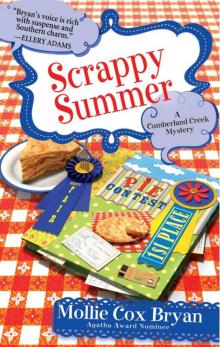 Scrappy Summer
Scrappy Summer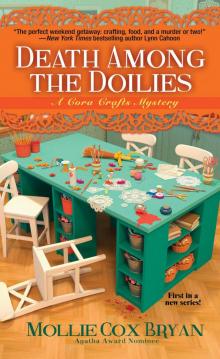 Death Among the Doilies
Death Among the Doilies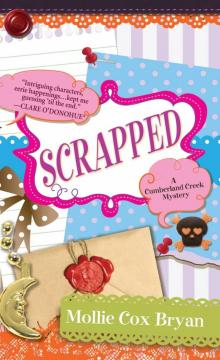 Scrapped
Scrapped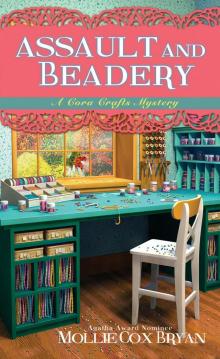 Assault and Beadery
Assault and Beadery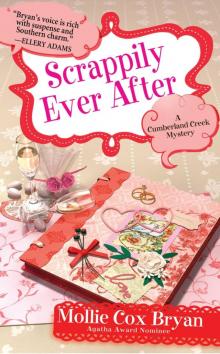 Scrappily Ever After
Scrappily Ever After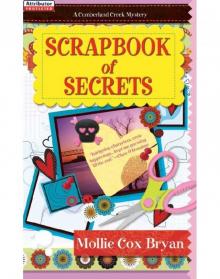 Scrapbook of Secrets
Scrapbook of Secrets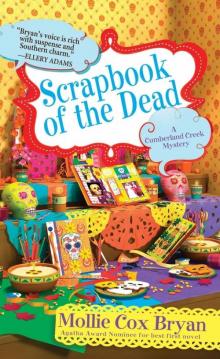 Scrapbook of the Dead
Scrapbook of the Dead